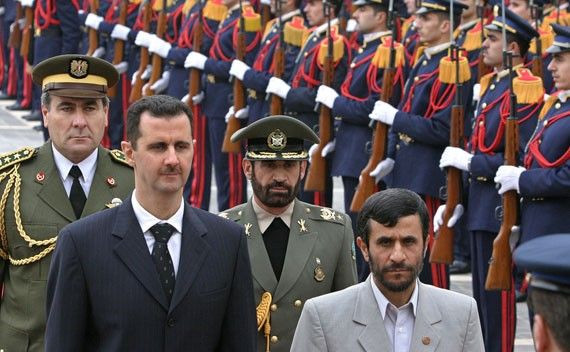What Are Iranian Special Forces Doing In Syria?

The only surprising thing about Iran sending special forces to back up embattled president Bashar al-Assad in Syria is that Revolutionary Guard General Ismail Qa'ani has finally said publicly that it is doing so. Iran has been training Syrian soldiers since long before the uprising began, and with Teheran's vested interest in the fate of the allied Assad regime, that relationship could only be made stronger by the 14-month-long rebellion.
Nonetheless, Qa'ani, the second-in-command of Iran's infamous Quds Force, has given the first real indication of what the Islamic Republic is actually up to in Syria.
The Quds, named for the Farsi word for Jerusalem, are Iran's special forces unit -- in American equivalents, a mix between black-ops and the CIA. As the Revolutionary Guard's external force, the Quds support and facilitate Islamic movements in other nations on Teheran's behalf, movements that allegedly include terrorist organizations.
Quds are adept at coordinating sabotage missions outside Iran, said Dilshod Achilov, a professor of Middle East politics at East Tennessee State University. And in Syria's case, he said, it's not just a few soldiers we're talking about, but highly trained units who know the area and the terrain and are in close cooperation with the Syrian regime.
According to Qa'ani, the Quds have actually had a positive effect on the situation in Syria. He told the semi-official Iranian Students' News Agency that if the Islamic republic was not present in Syria, the massacre of people would have happened on a much larger scale.
In reality, the opposite may be true. Qa'ani may think that Iran is keeping what Assad calls armed terrorists at bay, but the Quds are undoubtedly helping the Syrian regime attack the opposition and its own people.
As long as the Iranian regime is keeping Assad in power, the Syrian people are at risk, said Mark Jacobson, the Senior Transatlantic Fellow at the German Marshal Fund.
The extent of Iran's involvement in Syria is unclear. So far, Qa'ani's interview is the closest thing to an official confirmation of the Quds' presence there. Western observers believe that the Iranians are not only training Syrian soldiers, but also actively engaging in battle with opposition fighters.
The Iranian interference in Syrian affairs includes training militia on the responses of the demonstrators, as well as providing the techniques and devices to do so, including bugging devices, surveillance, and the transfer of large shipments of weapons including assault rifles and machine guns, explosives and explosive devices and rocket artillery and tanks, a spokesperson for the Syrian Nation Council, the umbrella group of the opposition, said.
Iran also participated in security operations to hunt down opponents of the (Syrian) regime, the spokesperson added.
Battle of Zabadani
On Tuesday, U.S. State Department spokesperson Victoria Nuland said that the Shabiha militia, accused of carrying out the Houla massacre, has been modeled after Iran's paramilitary Basij force, suggesting that the Iranian military could have trained the Syrian civilian soldiers.
Two days later, Pentagon spokesman Navy Capt. John Kirby told reporters that he has reason to believe that Iran continues to assist the Assad regime in committing these acts of atrocities against the Syrian people, and on the same day, Secretary of State Hillary Clinton said during an appearance in Copenhagen that Quds are coaching the Syrian military ... helping them set up these sectarian militias.
By some accounts, the Quds have been in Syria since January, when Assad's forces clashed with rebels in the battle of Zabadani. At the time, the Free Syrian Army, the primary armed resistance, was in control of the city and apparently well equipped to defend it from the government regulars. Knowing that Zabadani is strategically important for both Syria and Iran because of its proximity to Lebanon, less than 10 miles from the border, Assad's generals called in the Quds, as well as another Iranian ally, the Lebanon-based Shiite movement Hezbollah, for help.
The Syrian intelligence weren't qualified; they didn't have decent snipers or equipment, Mahmoud Haj Hamad, the Inspector General with Syrian Ministry of Defense, who has defected to the West, told the Times in January. They needed qualified snipers from Hezbollah and Iran, which they got, and then used to reclaim the city in just a few days.
After the battle, Quds leader General Qassem Suleimani joined the Syrian military command apparatus, according to the former head of the U.S. Air Force Office of Special Investigations, Steven K. O'Hern, who runs the Intelligence Wars blog. Suleimani is reportedly a regular visitor to Assad's war room in Damascus.
The Enemy Of My Enemy
The friendship between Syria and Iran stems from shared enemies. The two countries first signed a military pact over their mutual dislike of Saddam Hussein in Iraq. Now, with Saddam out of the way, Teheran sees Syria as a regional counterweight to Israel, Iran's sworn enemy.
There is also a religious aspect, with Iran's Shiite leaders and Syria's Alawites on one side and Sunni Muslims on the other. Involved in that dynamic now is Lebanon's Hezbollah, the Shiite political group that still has a paramilitary wing. Iran and Syria are Hezbollah's biggest military, financial and political supporters, and Syria offers a bridge between Iran and Lebanon. If Assad falls, Iran doesn't just lose its closest ally: It may also lose a direct geographical link to Hezbollah.
Still, Iran's future involvement in the Syrian conflict is unpredictable, mostly because the outcome of the Syrian conflict itself is still uncertain. As long as the fight between the government and the rebels continues as it has for the past year, Iran may be content operating behind the scenes. But the one thing it won't do is go away: The roots go very deep, and Iran is very invested, said Achilov. We cannot expect Iran to let Syria go without a fight.
© Copyright IBTimes 2024. All rights reserved.





















